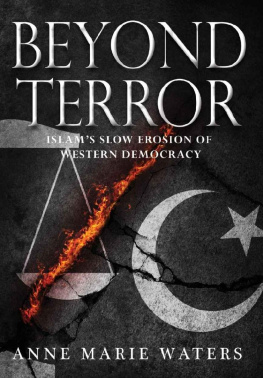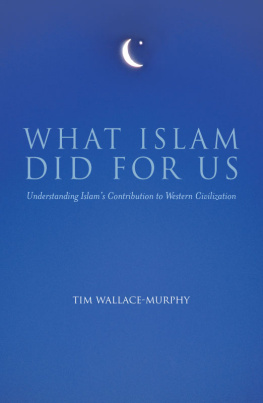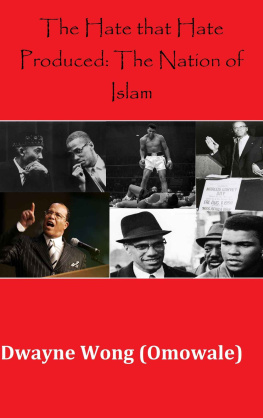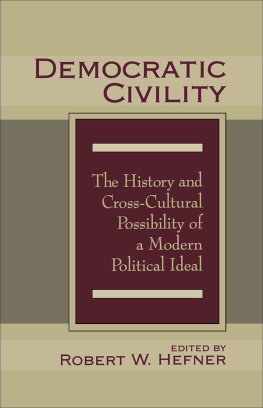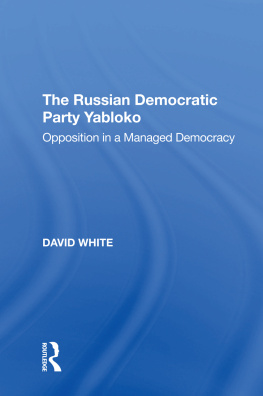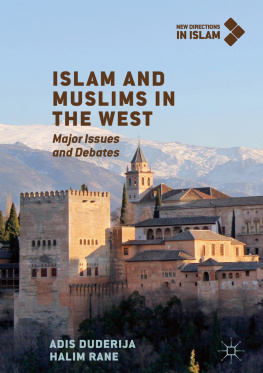BEYOND TERROR
ANNE MARIE WATERS
BEYOND TERROR
ISLAMS SLOW EROSION OF WESTERN DEMOCRACY
BEYOND TERROR: Islams Slow Erosion of Western Democracy copyright 2018 by Anne Marie Waters.
All rights reserved. No part of this book may be reproduced in any form whatsoever, by photography or xerography or by any other means, by broadcast or transmission, by translation into any kind of language, nor by recording electronically or otherwise without permission in writing from the author, except by a reviewer who may quote brief passages in critical articles or reviews.
ISBN 13: 978-0-9846938-8-7
Library of Congress Control Number: 2018947633
Printed in the United States of America
First Printing: 2018
18 17 16 15 14 5 4 3 2 1
Cover art by Judith Nicols
Cover design by Glen Edelstein
Interior design by Glen Edelstein
SOMETHING
OR OTHER
PUBLISHING
For bulk orders e-mail:
This book is dedicated to those who tell the truth.
FOREWORD
By Daniel Pipes
Every European country with an advanced Islamist problem has a political party in parliament focused on dealing with this challenge - except one, the United Kingdom. This absence of what I call a civilizationist party (because it seeks to save Western civilization) has profound implications; it means the British have no way to enact legislation against the Islamist threat nor do the existing parties feel pressure to pay attention to it. For this reason, Londonistan has the bleakest prospects of any Western country.
Anne Marie Waters, author of the book in your hands or on your screen, is one of the few who can fill the gap. As Beyond Terror: Islams Slow Erosion of Western Democracy amply shows, she has the biography, skills, knowledge, and will to found a civilizationist party. Indeed, she initiated the process in late 2017 by establishing For Britain, a party for the forgotten majority.
Seen in this light, Beyond Terror serves the triple purpose of self-introducing Waters to the public, documenting the civiliza-tional problem, and laying out her policies.
The self-introduction emphasizes her and the Lefts mutual disaffection; it shows how criticism of Islamism rendered her longstanding political home no longer hospitable. I found her insiders views illuminating, especially how pro-Islamism has become integral to the Lefts world view and program. Its reached the point, Waters explains, that the modern political Left will turn on its comrades if they fall out of favour with Islam. Strangely, opposing a far-Right religious extremism that openly discriminates and condones violence against women, executes homosexuals, and punishes dissenters with the sword gets one in big trouble.
This could only happen because the modern Left has adopted a whole new set of priorities. No longer concerned with the rights of the working classes or protecting vulnerable minorities, the new university-educated middle-class Left is an ideological beast. In other words, economics is now secondary to identity politics. Workers, make way for the academics. Goodbye Marx, hello Gramsci.
Far Right is what The Economist calls Waters and what The Times of London calls For Britain; but this adjective outrageously distorts both their political identities. Waters comes from a strictly leftist background, having been a member of the Labour Party for about 10 years. Her political activism began in favour of keeping the socialist National Health Service. She served as both a trade union representative and as a board member of the National Secular Society. She calls herself a second-wave feminist and a near-free-speech absolutist.
Following her clash with the Left, her outlook now contains centrist qualities: She believes in personal liberty, in limited state intrusion, government accountability, low migration, and Christian- and secular-based Western civilisation. She favours the free market along with a strong public sector. She is a nationalist who opposes mass migration. In keeping with this profile, For Britain is neither Left nor Right, much less far Right, but represents what it calls the decent majority.
Waters is shy about providing specifics on her travails in starting the party (did you not wonder why this very British-oriented book is published in the American Midwest?) and discussing future tactics. I look forward to more information from her on these topics.
The second part surveys outrages of the Islamist scourge, knowledgeably covering twelve Western countries (with special attention to the United Kingdom and the United States) and lightly touching on several Muslim-majority countries. She documents the ravages of the combined Islamist-Leftist machine on such topics as freedom of speech, homosexuality, and school instruction.
The final part offers Waters prescriptions. She begins by noting that, when it comes to the twin issues of immigration and Islamization, the parties which dominate the British House of Commons, four in number, are entirely inseparable in their agreement on a deliberate sanitisation of Islam. She portrays this collusion as an elite arrogance that views the voting public as completely stupid.
Fortunately, if free speech has dramatically decreased among our leaders, it still exists in some form among ordinary people. And so, paraphrasing George Orwell, Waters turns to those ordinary people: Hope lies with the proles. A populist surge is needed, and now: The only way Islamism will be defeated, or even confronted, is through the power of the people. We must use our vote and our right to stand for political office in order to unseat complicit MPs.
She outlines a program consisting of five steps:
- Restore accountable government by returning power from international institutions (i.e., the European Union) to the nation-state.
- Teach children positively about their country.
- Apply one law to all, thereby ending harmful Islamic practices.
- Take control of immigration and deport immigrant criminals.
- Keep a close watch on Islamic institutions for signs of Islamism.
These are unarguably sensible policy prescriptions, though I would add a #6: Marginalize Islamism and help strengthen moderate Islam.
Waters understandably does not include such a recommendation. She writes: I do not believe that Islam and Islamism are distinct.... Islamism is merely the political implementation of the doctrines of Islam. In contrast, I hold the two are distinct: Islam is the entire faith, Islamism is one (extremist) interpretation of it. For Waters, Islamism represents the only true form of Islam; for me, it is just one way of implementing Islam and other, more benign interpretations exist and are equally valid.
This matter has profound importance: Waters disbelieves, and I do believe in a moderate Islam. She has no hopes for changes in Islam; I argue that radical Islam is the problem and moderate Islam is the solution. Among other benefits, my approach offers the possibility of cooperating with anti-Islamist Muslims, something I hope For Britain will make a priority.
Despite our disagreement on the nature of the enemy, Anne Marie Waters and I stand in the same trench, fighting the same opponents. I therefore hope this manifesto will contribute to creating the UKs urgently needed civilizationist party, that For Britain will soon enter parliament, and once there, it will help shape the countrys future.
Daniel Pipes
President, Middle East Forum
Philadelphia, Pennsylvania
April 2018
CONTENTS

